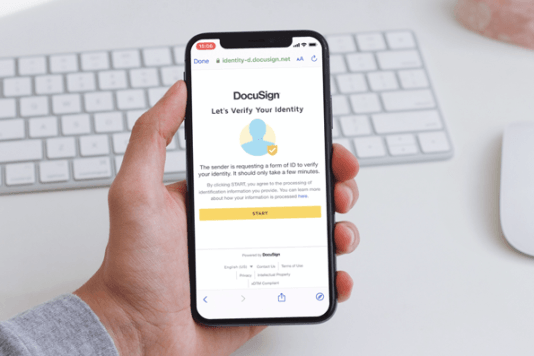DocuSign + UserTesting


About DocuSign
DocuSign helps organizations connect and automate how they prepare, sign, act on, and manage agreements. As part of the DocuSign Agreement Cloud, DocuSign offers eSignature: the world's #1 way to sign electronically on practically any device, from almost anywhere, at any time. Today, more than half a million customers and hundreds of millions of users in over 180 countries use DocuSign to accelerate the process of doing business and to simplify people's lives.
DocuSign achieved


Challenge
For highly sensitive documents, people need confidence that the identity of the person signing the document has been verified with a valid form of identification. DocuSign ID Verification is a solution that enables senders to verify signers’ identities before they access agreements. It supports government photo IDs and electronic identifications by analyzing the document security features (barcodes, holograms, etc.) and matching the name on the agreement against the name on the ID. After a successful verification, the signer can view and sign the agreement.
However, the DocuSign team knew that users would experience a wait time while the system completed the verification process. But waiting too long can make people start to feel frustrated and wonder what’s wrong, especially when they’re used to something being fast and easy.
To ensure that users wouldn’t get frustrated as they waited, The DocuSign team wondered how they could turn that potentially frustrating and confusing waiting experience into a positive and confidence building one.
Solution
Morgan Davis, Manager of User Research and Gabi Moore, Principal Product Designer at DocuSign, collaborated and came up with a brilliant idea to compare customer reactions in two situations: one in which users successfully completed the verification, and another in which they failed.
He turned to the UserTesting platform for two reasons. First, he knew it would be easy to design and launch a test and get results in a matter of hours. Secondly, he knew that UserTesting would allow him to uncover exactly how users felt in each scenario and pinpoint both when and why users felt that way by hearing them ‘think out loud’ and observing their exact behaviors after each situation.
The team’s designer created three prototypes to compare reactions while users waited during the ID Verification process. Each design displayed different levels of information—limited information, some information, or detailed information—which were randomly assigned to each contributor.

Which design would users like best? Which would give the user the most confidence while waiting? Would animations help or hurt the experience? These were some of the questions the team would soon have answered.
Outcome
DocuSign discovered that the prototype design that provided detailed information generated significantly higher levels of user confidence—even when users failed in their attempt to verify their identity—because waiting with information made them feel informed whereas waiting without information made them feel confused or upset and more likely to give up.
“I felt informed as I was waiting for my information to be verified as I was told what was happening at every step in the process. I never had to wonder if it was working or not, and knowing this helped streamline the experience and reduce any frustration I may have otherwise had.” – UserTesting contributor
Morgan and his team used these insights to launch an improved ID Verification experience where signers were informed with helpful information about the status of their verification as it was happening. The new design not only resulted in significantly lower levels of user frustration but generated a 25% increase in ID Verification success rates along with significantly more engaging user experience based on user sentiment.
 Morgan DavisSenior Manager, User Research, DocuSign
Morgan DavisSenior Manager, User Research, DocuSign“UserTesting empowers our team to adapt faster than ever. With real human insight at our fingertips, we’re now turning traditionally frustrating experiences into delightful ones. Testing these experiences today ensures our success tomorrow.”



